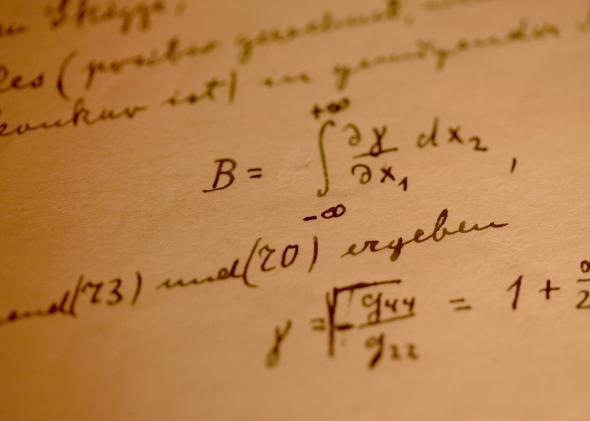The Imitation Game, a glossy new biopic about the British cryptanalyst Alan Turing, features a lot of maths. Characters take advanced maths classes that require them to scribble complicated maths on notebook paper, and then they set their sights on the devilish maths of the Nazi Enigma machine. To American audiences, all those maths might seem doubly mysterious in their propensity to add and multiply. We Yanks prefer to pledge allegiance to the Math, indivisible, under God.
For a field centered on numbers, math seems pretty confused about its pluralization. Americans and Canadians tend to say math while Brits and Australians opt for maths. In defense of our star-spangled convention, “math” is more consistent with the way English speakers abbreviate disciplines like economics (econ) and linguistics (ling). Still, both versions are correct, if complicated by the fact that while mathematics sounds plural, it may actually be singular.
As “Lynneguist” Lynne Murphy explains on her blog, the S at the end of mathematics is only homonymous with the type of S that transforms one cook into too many cooks. It looks like a pluralizing S, but it acts like the deadbeat second S in chess. Mathematics qualifies instead as a mass noun (there goes another deadbeat S): The word may gesture toward quantity, but it is uncountable. Some mass nouns—anger, music, countryside—are too abstract to be divisible. Others—sushi, furniture, cinnamon—might break into discrete units, but these units add up to something slightly different than conventional plurals, such as dogs, pens, or cream cheese brownies.
Intriguingly, mathematics fits both definitions of a mass noun at once. It is a broad type of inquiry—“the abstract science of number, quantity, and space”—AND a bundle of countable disciplines, including geometry, trigonometry, and algebra. Either way, it prefers singular verbs. (“Mathematics is the language with which God wrote the Universe,” said Galileo.) Before the singular noun mathematic entered the lexicon in the 14th century, it did a stint as a Greek adjective, mathematike, as in mathematike tekne, or “technological science.” Before that, it was a noun, mathema (sorry, high school self, no relation to anathema), meaning “lesson” or “that which is learnt.” Its cognates include the Greek verb for “to care,” which also gives us “memory” and “mind,” and a German adjective signifying “lively” or “awake.” (If etymology were destiny, no one would ever be bored in math class.) As Word Detective points out, you can see the semantic roominess of the original math in terms like “polymath,” which deals less with the art of quantification than with knowledge in general.
In the 17th century, English speakers fell under the spell of a peculiar linguistic fad. With some exceptions, they started to use a seemingly plural form of a field of study to refer to it in the singular. Enter physics, acoustics, economics, acrostics. The rule wasn’t applied uniformly: Disciplines that had been around for a while, such as arithmetic, had already rooted deeply enough in people’s minds to avoid the trend. But mathematic, the classical and somewhat arcane science of all things numerical, acquired an S.
Math as an autonomous term for mathematics came first to the United States, in 1890. (Americans were using math. as a standard abbrev. as early as 1818, when War Secretary John C. Calhoun referred to a man named Davies, an “ass. prof. maths.,” in a letter. There is also an entirely different math, from Old English, that refers to mowing.) The British maths cropped up in 1911, and both terms leapt in usage for their respective countries during the second half of the 20th century.
But why the national disparity? While many differences between British and American English can be traced to Webster’s 1828 dictionary, which codified our favors and centers and realizations in defiance of the estranged motherland’s favours and centres and realisations, this one can’t. Webster didn’t include any abbreviations for mathematics in his masterwork. Anecdotal evidence suggests that notions of which words qualify as mass nouns vary widely across English-speaking countries. For instance, one Lexicon Valley reader email—or, one piece of Lexicon Valley reader email—revealed that, in South Africa, most English speakers treat email as a countable noun (“I’ve got a lot of emails”), and never a mass noun (“Please forward email to this address”). In the United States, we seem to want it both ways.
The Lynneguist points out that the pluralizing S is far more “productive”—more likely to actually appear in a context where it might go in theory—than the noun-marking S that perches like a grace note at the end of acoustics. So it stands to reason people will frequently mistake the second S for the first, especially with common words like mathematics. And perhaps it also stands to reason that an English-speaking culture more ostensibly concerned with proper usage will give heightened credence to their grammarly intuition when it tells them to insert an S, even where none is required. Really, though, fate and chance factor into linguistic trends as much as anything. It only takes a few solemn Oxford whizzes talking about maths before much of London catches on, and then Australia, and then … you do the maths.
